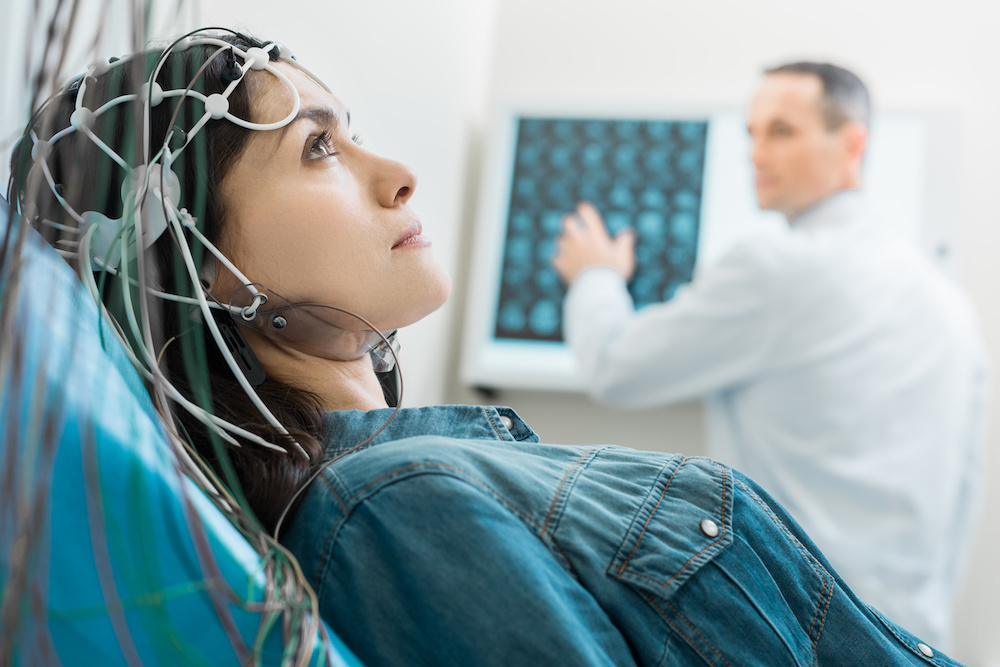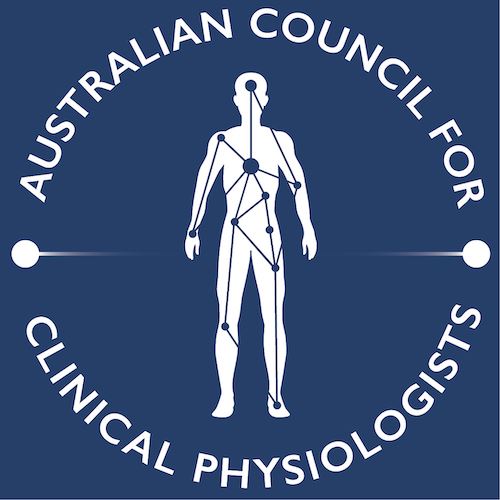What is a Clinical Physiologist - Neurophysiology?
A Clinical Physiologist (Neurophysiology) measures brain, nerve and muscle function. They see patients who may have Epilepsy, Stroke, Carpal Tunnel Syndrome, Motor Neuron Disease, Multiple Sclerosis, migraines, coma, or other nerve issues.
- Nerve Conduction studies (NCS): NCS’s are designed to assess the integrity of your peripheral nerves, particularly in your arms and legs, by measuring the size and speed of their electrical signals. To obtain measurements of your nerve impulses a recording electrode will be placed onto your skin, usually on your upper and/or lower limbs. Another electrode will be used to stimulate the nerve. The stimulator produces small electrical pulses which feel like a sharp tapping sensation. The process will be repeated for a number of different nerves.
 Electroencephalography (EEG): The EEG (Electroencephalogram) is a procedure that records the electrical activity of the brain (‘brainwaves’) via electrodes placed on the scalp. One use for EEG recordings is to check for the presence of abnormal electrical activity that may be seen in people with epilepsy. At times a sleep-deprived EEG test is done when you have had less sleep than usual. When you are tired, there is more chance that there will be unusual electrical activity in your brain. After resting quietly they may be asked to breath deeply and heavily (hyperventilate) for 3-5 minutes. Finally, the patient may be asked to look at flashing lights with eyes alternatively open then closed. These activities can change the electrical activity in your brain, and this will show on the computer. This can help the doctor to make a diagnosis.
Electroencephalography (EEG): The EEG (Electroencephalogram) is a procedure that records the electrical activity of the brain (‘brainwaves’) via electrodes placed on the scalp. One use for EEG recordings is to check for the presence of abnormal electrical activity that may be seen in people with epilepsy. At times a sleep-deprived EEG test is done when you have had less sleep than usual. When you are tired, there is more chance that there will be unusual electrical activity in your brain. After resting quietly they may be asked to breath deeply and heavily (hyperventilate) for 3-5 minutes. Finally, the patient may be asked to look at flashing lights with eyes alternatively open then closed. These activities can change the electrical activity in your brain, and this will show on the computer. This can help the doctor to make a diagnosis.- Evoked Potentials (EP): Sensory evoked potentials studies measure electrical activity in the brain in response to stimulation of sight, sound, or touch. When the brain is stimulated by these; signals travel along the nerves to the brain. Your brain produces electrical current in response to information that comes in through your senses. This current can be detected on your scalp, using electrodes attached with sticky pads or paste. As damage to the nerves can slow down the sending of nerve signals, evoked potential tests can indicate nerve pathways that are damaged.
- Intraoperative Neurophysiologic monitoring (IONM): Patients benefit from neuromonitoring during certain surgical procedures, namely any surgery where there is risk to the nervous system. Intraoperative neuromonitoring (IONM) protects patients by continuously monitoring the central nervous system (the brain, spinal cord, and nerves) when it is at risk during surgery, it is a way to monitor the integrity of your nerves during surgery. The term “intraoperative” translates to “within (intra) the operating room (operative).” The term neurophysiological refers to the nervous system. Depending on the procedure, a variety of tests can be used to measure the nervous system function. Intraoperative monitoring allows the clinical physiologist and surgeons to quickly identify early warning signs of changes to the function of your nerves during surgery, thereby enabling them to adapt or modify the procedure to minimize or avoid potential postoperative difficulties.
Find Out More.
If you would like to find out more information about Neurophysiology health please see the following Australian websites:
Epilepsy Action Australia
Epilepsy Australia

 Electroencephalography (EEG): The EEG (Electroencephalogram) is a procedure that records the electrical activity of the brain (‘brainwaves’) via electrodes placed on the scalp. One use for EEG recordings is to check for the presence of abnormal electrical activity that may be seen in people with epilepsy. At times a sleep-deprived EEG test is done when you have had less sleep than usual. When you are tired, there is more chance that there will be unusual electrical activity in your brain. After resting quietly they may be asked to breath deeply and heavily (hyperventilate) for 3-5 minutes. Finally, the patient may be asked to look at flashing lights with eyes alternatively open then closed. These activities can change the electrical activity in your brain, and this will show on the computer. This can help the doctor to make a diagnosis.
Electroencephalography (EEG): The EEG (Electroencephalogram) is a procedure that records the electrical activity of the brain (‘brainwaves’) via electrodes placed on the scalp. One use for EEG recordings is to check for the presence of abnormal electrical activity that may be seen in people with epilepsy. At times a sleep-deprived EEG test is done when you have had less sleep than usual. When you are tired, there is more chance that there will be unusual electrical activity in your brain. After resting quietly they may be asked to breath deeply and heavily (hyperventilate) for 3-5 minutes. Finally, the patient may be asked to look at flashing lights with eyes alternatively open then closed. These activities can change the electrical activity in your brain, and this will show on the computer. This can help the doctor to make a diagnosis.
